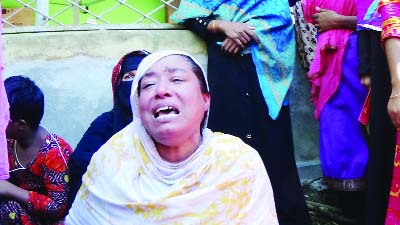
BSS, Rangpur :
Experts here have stressed on creating awareness among the vulnerable group of people by disseminating education, knowledge and social values to prevent spread of HIV/AIDS.
Rangpur Drop-in-Centre (DIC) of Light House Consortium under management of International Centre for Diarrhoeal Disease Research, Bangladesh (ICDDR,B) organised programme at Civil Surgeon conference room on Tuesday.
The meeting was arranged under Prioritized HIV Prevention Services for Key Population in Bangladesh with assistance of the Global Fund Project to bring vulnerable group population under medicare facilities for preventing spread of these diseases.
Public representatives, transgender people, teachers, lawyers, police, religious leaders, civil society members and local elite participated in the programme.
Deputy Commissioner Enamul Habib attended the meeting as the chief guest with Civil Surgeon Dr Abu Md Zakirul Islam in the chair. Deputy Director of the Department of Social Services Abdur Razzaque and Deputy Civil Surgeon DrKaniz Sabiha addressed as special guests.
Rangpur DIC Manager of ‘Light House’ Mohammad Shahabul Islam delivered keynote presentation narrating activities of the organisation and latest national level statistics of HIV/AIDS infection and related deaths.
“A total of 5,586 people were infected with HIV viruses and 924 withAIDS in Bangladesh till 2017. Of them, 125 AIDS patients died in 2017 alone,” Shahabul said.
Lawyer Advocate Isahaque Ali, representative of transgender community Marufa Akhter Mitu, journalist Nazrul Islam Raju, City Councilor Muntaseer Shamim Laiku, Imam Md Zinnuraine, Purohit Girija Sankar Chakraborty, NGO executive Sarothi Rani Saha, among others addressed.
Sarothi Rani Saha said if the vulnerable groups continue their unsafe sexual habit and blood donation, possibility of spreading the HIV/AIDS and other Sexually Transmitted Diseases (STDs) may increase.
Dr Zakirul Islam urged public representatives and community leaders for conducting awareness building campaign among vulnerable groups and floating sex workers in both urban and rural areas.
Experts here have stressed on creating awareness among the vulnerable group of people by disseminating education, knowledge and social values to prevent spread of HIV/AIDS.
Rangpur Drop-in-Centre (DIC) of Light House Consortium under management of International Centre for Diarrhoeal Disease Research, Bangladesh (ICDDR,B) organised programme at Civil Surgeon conference room on Tuesday.
The meeting was arranged under Prioritized HIV Prevention Services for Key Population in Bangladesh with assistance of the Global Fund Project to bring vulnerable group population under medicare facilities for preventing spread of these diseases.
Public representatives, transgender people, teachers, lawyers, police, religious leaders, civil society members and local elite participated in the programme.
Deputy Commissioner Enamul Habib attended the meeting as the chief guest with Civil Surgeon Dr Abu Md Zakirul Islam in the chair. Deputy Director of the Department of Social Services Abdur Razzaque and Deputy Civil Surgeon DrKaniz Sabiha addressed as special guests.
Rangpur DIC Manager of ‘Light House’ Mohammad Shahabul Islam delivered keynote presentation narrating activities of the organisation and latest national level statistics of HIV/AIDS infection and related deaths.
“A total of 5,586 people were infected with HIV viruses and 924 withAIDS in Bangladesh till 2017. Of them, 125 AIDS patients died in 2017 alone,” Shahabul said.
Lawyer Advocate Isahaque Ali, representative of transgender community Marufa Akhter Mitu, journalist Nazrul Islam Raju, City Councilor Muntaseer Shamim Laiku, Imam Md Zinnuraine, Purohit Girija Sankar Chakraborty, NGO executive Sarothi Rani Saha, among others addressed.
Sarothi Rani Saha said if the vulnerable groups continue their unsafe sexual habit and blood donation, possibility of spreading the HIV/AIDS and other Sexually Transmitted Diseases (STDs) may increase.
Dr Zakirul Islam urged public representatives and community leaders for conducting awareness building campaign among vulnerable groups and floating sex workers in both urban and rural areas.

